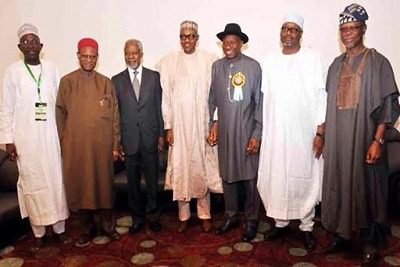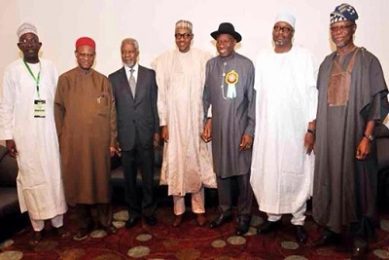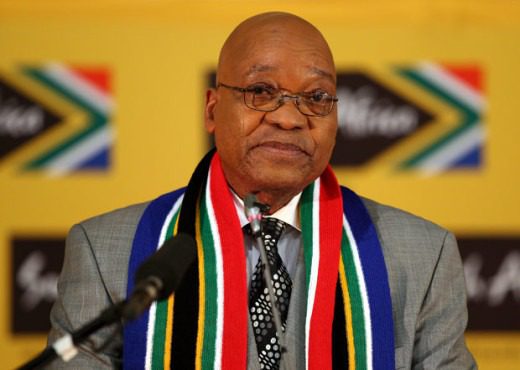National Issues
Can Abuja Peace Accord guarantee non-violent elections? -By Jide Ojo

It is campaign season and the political gladiators have been gallivanting across the length and breadth of the country trying to woo voters towards getting their support in the forthcoming elections of February 14 and 28, 2015. How I love the colourful and flamboyant dressing of the political actors on their campaigns. It’s a new “Aso ebi” for each campaign venue. The musicians are having a field day and the Nigerian media is also having a bumper harvest. What with the countless live telecasts of campaigns; the political jingles and newspaper advertorials. The Public Relations firms and advertising agencies are also not left out of the cake sharing. Many of them are having a swell time placing adverts on behalf of their clients, mounting political billboards and performing sundry other services for their political clients. It’s their season of boom and I am sure they’ll not want it to end.
However, accompanying all the glitz and glamour of the campaigns are the veiled insults, hate speeches, inciting comments, baseless rumours, innuendoes and unsubstantiated allegations being levelled by political gladiators against one another. Experience, they say, is the best teacher and given the pre-and post-election violence that happened in 2011 in which over 800 persons died and properties worth billions of naira destroyed, there was therefore palpable fear that this year’s elections would be fiercer and bloodier. Many local and international organisations such as CLEEN Foundation, National Association for Peaceful Elections in Nigeria, the United Kingdom Agency for International Development, International Crisis Group, European Union and some others have been covertly and overtly expressing worry about the likely outbreak of violence during the elections. At the individual level, eminent personalities like Prof. Bolaji Akinyemi did raise highbrows about the volatile nature of the forthcoming polls. It was actually his prime idea that leading political contestants should be made to sign a peace bond.
Perhaps, it was to the suggestion of the erudite scholar and former Minister of Foreign Affairs that the Office of the National Security Adviser and Office of the Special Adviser to the President on Inter-Party Affairs harkened when on January 14, 2015 they jointly organised a one-day sensitisation workshop on non-violent election which had in attendance a majority of the presidential candidates, members of the diplomatic corps, national chairmen of some political parties, youth groups, chairman of the Independent National Electoral Commission, civil society organisations and other stakeholders in the electoral process. The main highlight of the workshop was the identification of factors that could trigger electoral violence and how to nip them in the bud. The workshop culminated in the signing of the Abuja Peace Accord by key presidential candidates.
I watched part of the live telecast of the event and heard speeches made by the INEC chairman, and some of other distinguished personalities at the event chaired by a former Secretary General of the Commonwealth, Chief Emeka Anyaoku, and had as the guest speaker, the ex-Secretary General of the United Nations, Dr. Kofi Anan. I observed from what was said at the event that indeed knowledge of issues that can cause electoral violence is well understood by our political class and educated elite. However, the area of dissension is on the antidote.
The Abuja Peace Accord is desirable, reasonable and is a useful alternative dispute resolution mechanism. It is well-crafted but is it enforceable? It is true that the intentions of the framers are noble but they need to be reminded that there are non-violence clauses in the 1999 Constitution of Nigeria, as amended, the 2010 Electoral Act, as amended, the Code of Conduct for Political Parties, and in the constitutions of each of the political parties; why then do we continue to experience high level of violence in our polity and during elections? It’s simply because enforcement has been weak.
How many of the perpetrators of the 2011 pre-and post-2011 election violence had been punished for their dastardly acts? This culture of impunity is majorly responsible for the festering of election-related violence. Yes, President Jonathan wants us to adopt a political system that will spread the benefit of elections rather than the current winner-takes-all system we use. Good thinking! But are those suggestions not late in the day given the near conclusion of the constitutional amendment? The APC’s Muhammadu Buhari at the forum alleged underhand dealings by INEC in the collation of his votes in 2011 and the meddlesomeness of the executive in the judicial review of the presidential election at the election petitions tribunal. Should that be true and replicated in the forthcoming February 14 poll? Will the signed pact be sufficient to rein in his supporters who may want to resort to self-help?
The point here is that there can never be peace without justice. All the stakeholders in the electoral process need to play by the rules whether it is the INEC, security agents, judiciary, political parties and contestants, the media, civil society, the legislature and the electorate. We all must do the right thing before the losers will deem it fit that they have lost at the polls fair and square and not rigged out. For instance, I am not yet seeing enough of conflict sensitive reporting by the Nigerian media. Many are still publishing rumours as facts. The security agents have yet to demonstrate sufficient professionalism in handling the political tension and election security matters. The Electoral Act for the forthcoming elections has not yet been passed by the National Assembly less than a month to the commencement polls. It remains unclear if INEC has received its outstanding funding for the polls. The pre-election litigations arising from the badly conducted party primaries in November and December 2014 have been stalled by virtue of the strike by judicial workers. All these are ominous, telltale signs of impending combustion and disaster.
As earlier submitted, the peace accord of January 14 is a step in the right direction but it is insufficient to prevent violence and deliver credible elections. All actors and stakeholders must play by the rules of the game and where there are infractions, adequate punishment must be applied by relevant regulatory agencies without minding whose ox is gored.





















